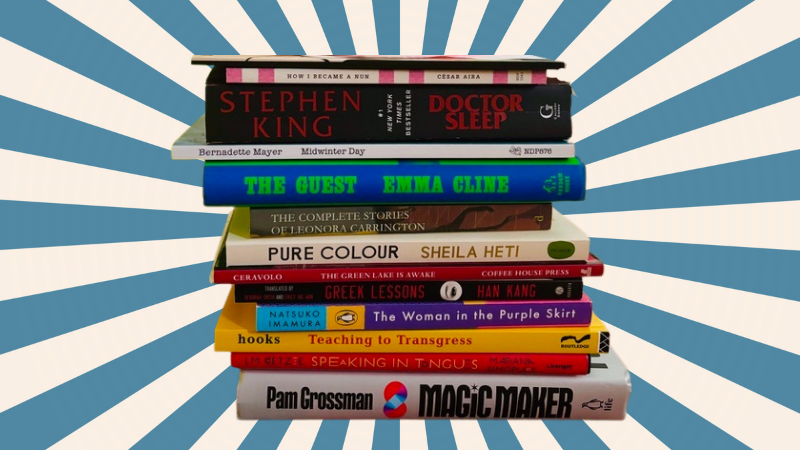
The Annotated Nightstand: What Dorothea Lasky Is Reading Now, and Next
Featuring Emma Cline, Bernadette Mayer, Han Kang, and More
The poet Bernadette Mayer’s Memory is capacious in its scope. Mayer, the iconic poet perhaps best known for her poem tracing midwinter day in a volume of that title, took a roll of film for each day of a month and maintained a daily diary. Mayer said about the subsequent exhibition: “If you wanted to hear the whole show, you could follow the whole month by walking along with the pictures and spend eight hours in the gallery.” (You can read an excerpt of the text of Memory and see some images here—it was published in a single volume by Siglio Press.)
Mayer’s desire to document and probe memory is perhaps why she is an obvious touchstone for the poet Dorothea Lasky’s new essay collection that shares Mayer’s title. “Her beautiful pictures and writing are reminders that no memory is perfect,” Lasky writes. Mayer resurfaces throughout Lasky’s Memory—regarding her photographs or poems or a pithy quotation—while Lasky considers the memories of her own life. The consistent thread: the loss of both of her parents, the deaths of friends, the intensity of a pregnancy that resulted in a baby consigned to the NICU until her lungs could breathe on her own. In short, at the heart within the kernel of concern for memory is a concern for death.
When loved ones die, society tells us, they continue to live on in our memories. It’s a paltry recompense. Somehow, we have to contend with the terrible gap between what we wish we had (the dead back to life) and that with which we’re left (memories). This while, as Lasky pointedly notes, “No memory can ever be trusted.” Thus much of this collection is an homage to memory, particularly those for whom Lasky must contend with being “in loving memory”—the dead. (I was particularly glad to see the inclusion of her moving essay “Why I Am Sad” about, among other things, the mistreatment of grief and dying by others, and which was an insert chapbook in her Wave collection Milk.)
There are love letters to the dead in Lasky’s life interwoven into these essays, including to her father (a judge who died, slowly, from Alzheimer’s), her artist mother, her dog Lucy, beloved poet friends, Mayer herself. Lasky also integrates tangential but no-less-compelling topics, like the show-stopping style of Iris Apfel and her influence on Lasky’s mother, and Lasky’s evergreen obsession with The Shining.
To that end, Lasky is sure to give plenty of attention to the unearthly, haunting, and ethereal traces that mark our world. This can also be intergenerational memory and those who were victimized by genocidal progroms, something Lasky feels in her body while walking around Berlin. Or a portrait Lasky’s mother painted at 16 years of age that bears an uncanny resemblance to Lasky’s father—a man she wouldn’t meet for almost two decades (this is the cover of the book). “[D]on’t depend on the mind to always know the truth,” Lasky says. “Don’t depend on poetry to mean anything. Because when you do, you really are in for a rude awakening.”
Lasky tells us about her to-read pile: “My bedroom is the room I spend the greatest amount of time in. It is the sunny place where I dream the most of what can be. So, it makes sense that my nightstand books––a collection of past-loved books and ones I am interested in reading next—are all books with ideas that fill me with delight and help me dream of the future.”
*
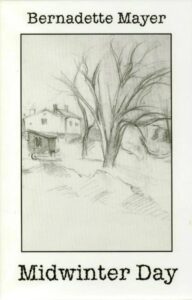
Bernadette Mayer, Midwinter Day
On December 22, 1978, Bernadette Mayer penned her book-length poem Midwinter Day, which describes a single day at her home in Lenox, Massachusetts. A professor told me a (potentially apocryphal) story that a journalist had come to visit Mayer’s then-husband Lewis Warsh after the couple had decamped from New York to the Massachusetts town. Seeing Mayer wrangle the kids while Warsh answered questions, the journalist asked, “and do you take care of the children?” Midwinter Day was a rageful response inspired by Ulysses in its epic descriptions of the quotidian. In this spirit, as with Bloomsday, there are Midwinter Day marathon readings!
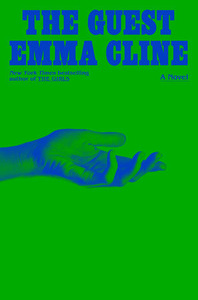
Emma Cline, The Guest
A 22-year-old sex worker, Alex, has managed to flee a bad situation in NYC and ingratiate herself with a wealthy older man, Simon, living in his home. “But after a couple of missteps Simon tells her to leave. Alex is faced with a decision: she can return to the city,” writes Sarah Chihaya at the New Yorker, “or she can wait out Simon’s anger. She decides on the latter, convincing herself that he’ll welcome her back at his annual Labor Day party in a week. All she has to do is get through six days on her own, armed only with her designer clothes, her sedated wits, and a mostly dead phone.”
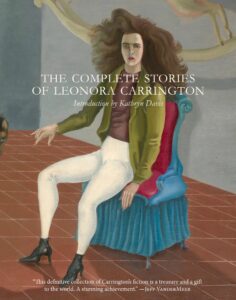
Leonora Carrington, The Complete Stories
Carmen Maria Machado writes at NPR of the beloved British-born Mexican-naturalized surrealist painter’s short fiction: “These stories have the distinct affect of fairy tales—intuitive logic that carries the reader from one moment to the next without a sense of cause-and-effect, the furthest distance from psychological realism as possible. A woman undresses down to her skeleton; a witch gives birth to a litter of boars and kills all but the one that most resembles its father, a monstrous sister kills the maid and flees while her captor and her captor’s lover hold an orgy in the middle of a feast—all in Carrington’s stripped-down, relatively abstract language.”

Sheila Heti, Pure Colour
In its starred review, Kirkus states of Pure Colour, “Any attempt to summarize Heti’s luminous new novel will inevitably leave it sounding faded and flat.” So I’ll let Heti speak for herself. In her interview on Between the Covers, Heti states, “a book is supposed to be a representation of how you understand the world to be. In my case with this book, the years that I was writing it, I had a very mystical experience…There’s different ways of conveying a mystical experience but one way is just to be very declarative because you can’t convince somebody of something irrational. You say it and it’s either believed or not believed.”
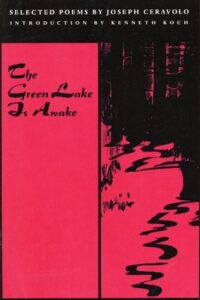
Joseph Ceravolo, The Green Lake Is Awake: Selected Poems
“This valuable contribution to American poetics restores Ceravolo’s boldly asyntactic yet stunningly precise work to book form.” Publishers Weekly states in its starred review. “A New York-born hydraulics engineer, the poet died in 1988 at the age of 54…His work, blending the sound-sculpting of a Clark Coolidge with deceptively calm, Ashbery-like meditations, carries within it an original and bewitching prosody as delicate as anything in Hopkins.”
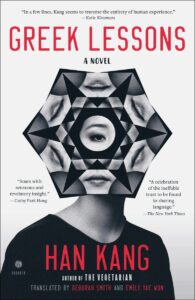
Han Kang, Greek Lessons (tr. Deborah Smith & Emily Yae Won)
“Greek Lessons is set in Seoul and tells of a friendship between a student of ancient Greek and her teacher,” writes Houman Barekat at the Times Literary Supplement. “The former is mute, the latter is going blind. Both are dealing with loss and grief…[The teacher] moved to Germany in his teens before returning to Seoul in his thirties; an obsessive interest in ancient Greek had helped him to cope with the trauma of displacement: ‘Its complicated grammatical system – and the fact that it was a long-dead language – meant Greek felt to me like a safe, quiet room’.”
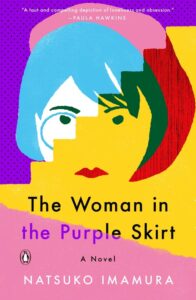
Natsuko Imamura, The Woman in the Purple Skirt (tr. Lucy North)
Julia Shiota reviews Imamura’s novel at Ploughshares, writing, “The narrator obsessively watches the titular woman, taking close stock of her movements and placing herself in situations where she might possibly interact with the Woman in the Purple Skirt. The unsettling meticulousness of the attention the narrator pays to the other woman is contrasted, however, with the seemingly innocent desire she has for human connection.”
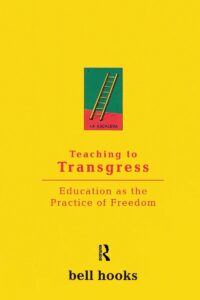
bell hooks, Teaching to Transgress
“Hooks wrote Teaching to Transgress in 1994, almost 30 years ago. At the time the book was embraced as a challenging, if not a radical, critique of the nature of higher education,” write Rebecca Maniglia, Jen Lee Gonyea, and Ashley Kilmer in a special issue of Contemporary Justice Review devoted to hooks. “In her accessible but deceivingly profound prose, Hooks presents engaged pedagogy – her vision for how teachers could and should be engaged in the ‘spiritual and intellectual growth of students’ (13) by transgressing the traditional boundaries of higher education. She challenged teachers to ‘teach in a way that respects and cares for the souls of our students’ (13).”
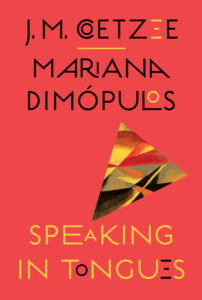
M. Coetzee & Mariana Dimópulos, Speaking in Tongues
Henry Hitchings at the Wall Street Journal writes, “In ‘Speaking in Tongues,’ a slim venture into nonfiction, he engages in an ‘amicable but intense’ dialogue with his Spanish translator, Mariana Dimópulos. In alternating and sometimes lengthy musings, they consider what is at stake when transposing information from one language to another—the duties it entails and what scope there may be for diverging from the original, not least if the text seems ‘clumsy or graceless or obscure.’”
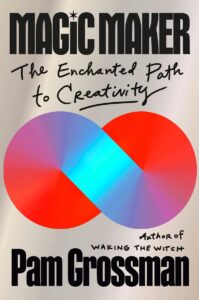
Pam Grossman, Magic Maker: The Enchanted Path to Creativity
In an interview at SheWrites, Grossman says of her hot-off-the-shelves book: “This book has been a lifetime in the making, weaving together my various perspectives as a scholar of artistic and occult history, a writer and podcaster, and a practicing witch…Eventually I realized that there really wasn’t much difference between writing a book, say, and casting a spell, because both are about taking Creative Force and turning into an intentional, material form that can hopefully transform the world for the better. And I also realized that many of my creative heroes like David Lynch, Diane di Prima, Lucille Clifton, and Tori Amos have blurred the line between creative practice and spiritual practice.”
Diana Arterian
Diana Arterian is the author of the recent poetry collection Agrippina the Younger (Northwestern UP, 2025) and editor and co-translator of Smoke Drifts (World Poetry Books, 2025), a collection of Nadia Anjuman's poetry. A Poetry Editor at Noemi Press, Diana has received fellowships from the Banff Centre, Millay Arts, and Yaddo. She writes “The Annotated Nightstand” column at Lit Hub and lives in Los Angeles.



















